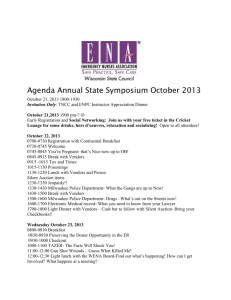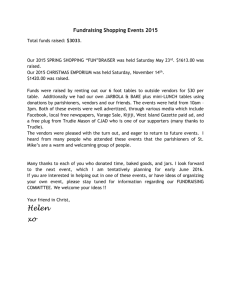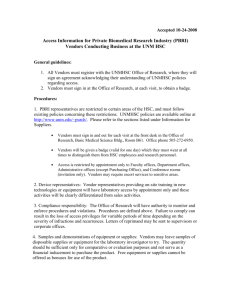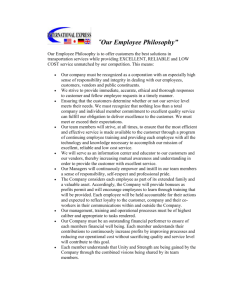Food trucks work to find their place in Fort Collins
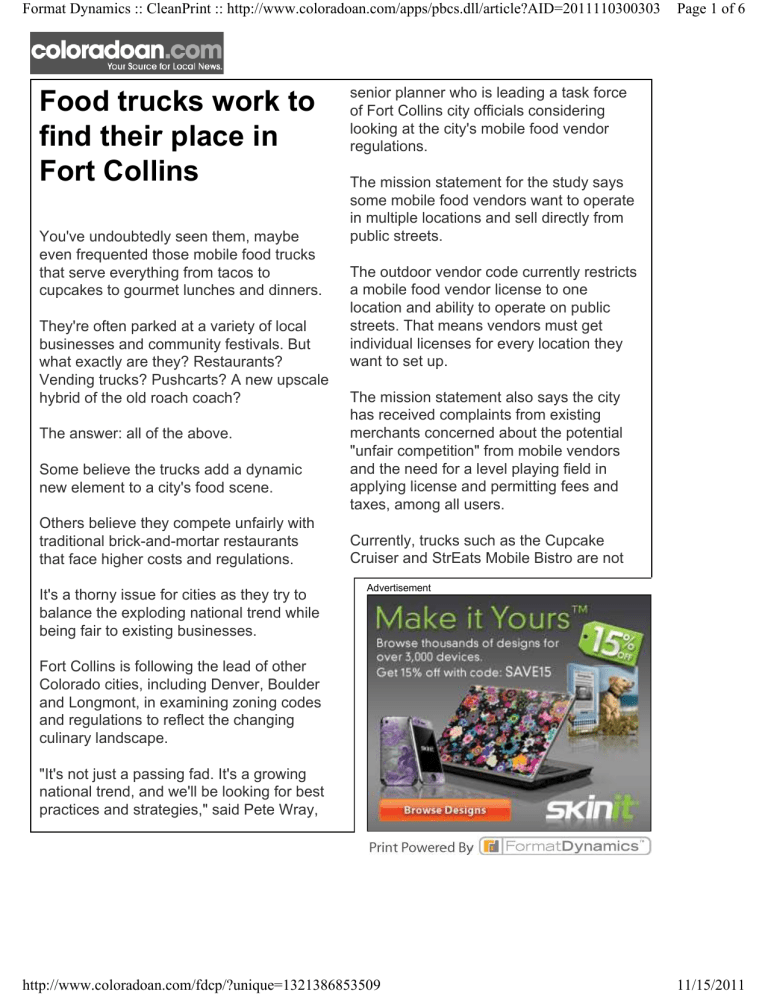
Format Dynamics :: CleanPrint :: http://www.coloradoan.com/apps/pbcs.dll/article?AID=2011110300303 Page 1 of 6
Food trucks work to find their place in
Fort Collins
You've undoubtedly seen them, maybe even frequented those mobile food trucks that serve everything from tacos to cupcakes to gourmet lunches and dinners.
They're often parked at a variety of local businesses and community festivals. But what exactly are they? Restaurants?
Vending trucks? Pushcarts? A new upscale hybrid of the old roach coach?
The answer: all of the above.
Some believe the trucks add a dynamic new element to a city's food scene.
Others believe they compete unfairly with traditional brick-and-mortar restaurants that face higher costs and regulations.
It's a thorny issue for cities as they try to balance the exploding national trend while being fair to existing businesses.
Fort Collins is following the lead of other
Colorado cities, including Denver, Boulder and Longmont, in examining zoning codes and regulations to reflect the changing culinary landscape.
"It's not just a passing fad. It's a growing national trend, and we'll be looking for best practices and strategies," said Pete Wray, senior planner who is leading a task force of Fort Collins city officials considering looking at the city's mobile food vendor regulations.
The mission statement for the study says some mobile food vendors want to operate in multiple locations and sell directly from public streets.
The outdoor vendor code currently restricts a mobile food vendor license to one location and ability to operate on public streets. That means vendors must get individual licenses for every location they want to set up.
The mission statement also says the city has received complaints from existing merchants concerned about the potential
"unfair competition" from mobile vendors and the need for a level playing field in applying license and permitting fees and taxes, among all users.
Currently, trucks such as the Cupcake
Cruiser and StrEats Mobile Bistro are not
Advertisement http://www.coloradoan.com/fdcp/?unique=1321386853509 11/15/2011
Format Dynamics :: CleanPrint :: http://www.coloradoan.com/apps/pbcs.dll/article?AID=2011110300303 Page 2 of 6 allowed on public property.They can't park on public streets, can't stop in residential neighborhoods for more than 15 minutes and aren't allowed on Old Town Square.
That means the only places they can go in
Old Town are on private property, with owner permission.
The generalized rules have left many mobile food truck vendors frustrated with their lack of mobility.
Growing opportunity
Amish Patel brought his StrEats Mobile
Bistro to Fort Collins in July, serving a variety of meats from around the world in taco, burrito and wrap form. He’s usually parked at OtterBox, Odell Brewing Co. or
Funkwerks on any given day.
He brought his food truck to Fort Collins, he said, because of its population, university students and breweries.
“I saw it as a good opportunity. Fort Collins will continue to see a rise in the number of food trucks,” Patel said. “I understand some cities don’t want the food-truck culture, but I don’t see that issue in Fort
Collins. Colorado is pretty laid back, so I hope they see something like this could help the community rather than it being a negative.”
Patel said business is good right now, and he averages between $1,100 and $1,300 a week, depending on the week.
“The community response has been great,” he said. “Fort Collins is ready for the food- truck culture. I hope the council will come up with a solution that we can all agree with and be on good terms with.”
Growing trend
According to a survey by Mobile Cuisine, a trade magazine for mobile food vendors, only two of the 50 largest cities do not allow food vendors. Chicago allows them but prohibits cooking in them; Memphis,
Tenn., and Wichita, Kan., don’t allow them, but a law is pending in Memphis that could change that.
For the most part, the mobile food vendor has been welcomed with open arms by almost all of these communities, the magazine writes.
“Unless, there is a rash of food truck banishments throughout the country due to unforeseen causes we cannot see how mobile food trucks can be called a ‘fad’
Advertisement http://www.coloradoan.com/fdcp/?unique=1321386853509 11/15/2011
Format Dynamics :: CleanPrint :: http://www.coloradoan.com/apps/pbcs.dll/article?AID=2011110300303 Page 3 of 6 anymore.”
Kati Anderson, who started The Cupcake
Cruiser with Matt Kenfield, said they knew establishing the business would be tough in
Fort Collins because of its existing regulations, “but from the beginning, we’ve really been trying to work with the city and abide by their rules very closely. We knew going in the city would consider us as a fast-food restaurant so we have to abide by all the same rules. That’s been a challenge. We can only go to certain places
… it’s a big deal to be able to sit in just one location on a regular basis.”
The Cupcake Cruiser has set up at Odell
Brewing Co., Larkburger, Lee’s Cyclery and other local businesses but would love to operate in Old Town after the brick-and- mortar businesses close for the day.
“Being in direct competition with brick- and-mortar stores is a big deal for them, and we understand that,” she said. “Maybe
(they could do something) that would restrict us from being parked within a certain distance to them … but we do think we should be able to park in a parking spot. That’s something that’s really holding us back.”
While mobile food vendors are allowed on the square, they can only include smaller carts of some kind, DDA Executive Director
Matt Robenalt said.
“We wouldn’t allow a van to pull up on the plaza and vend out of it. We have an understanding with Progressive Old Town
Square (that owns and leases the commercial property on the square) that vendors aren’t in direct competition with the storefronts on Old Town Square.”
Other than Old Town Square, the DDA has no statutory authority over the rest of Old
Town, Robenalt said. So, if the city changed regulations to allow mobile vendors to use parking spots in downtown, the DDA could not stop it even if it wanted to.
But Robenalt said restaurant owners in Old
Town long ago recognized and acknowledged “that just like when a new restaurant opens downtown, it creates another offering for visitors” and another reason for them to come downtown.
Advertisement
Operating at Old Town Square
Old Town Square, owned by the Downtown
Development Authority and managed by the Downtown Business Association, has two spots set aside for vendors. They’re currently occupied by hot dog and gyro vendors. http://www.coloradoan.com/fdcp/?unique=1321386853509 11/15/2011
Format Dynamics :: CleanPrint :: http://www.coloradoan.com/apps/pbcs.dll/article?AID=2011110300303 Page 4 of 6
Michael Short, director of the Downtown
Business Association, said from his standpoint, mobile food vendors have “ great potential and can really add something to the whole urban experience.”
But they do pose a challenge for Old Town
Square because of its limited space.
“When you move up to the next level of self-contained vehicles, we are hard pressed to find a place to put them,” Short said. “But I’m open to listening to any and all ideas to add that dimension to Old
Town Square,” he said while cautioning they still have space issues and current vendors to deal with.
Longmont may go mobile
The city of Longmont was set to adopt regulations allowing mobile food vendors within its core business district Tuesday.
But planner Ben Ortiz said the council deadlocked Tuesday on a $50 monthly fee for mobile food vendors operating in the
Downtown Development Authority boundaries.
“The DDA board wanted the fee because brick-and-mortar restaurants make some pretty significant investments in their businesses,” including handicapped- accessible restrooms, installation of grease interceptors as well as higher payroll and property taxes, Ortiz said.
“The $50 was a way to level the playing field.”
But the city attorney considered the fee to be a tax, and as such, it would have to go to the voters for approval. The ordinance was continued until Nov. 8, Ortiz said.
In general, if the ordinance goes through, mobile food vendors would be allowed to operate on public streets and public property as long as they met other city and county criteria, including health inspections.
The ordinance also restricts mobile food vendors from parking within 250 feet of other brick-and-mortar restaurants. On a main street filled with various eateries, the buffer “would keep mobile food vendors entirely off of Main Street and would push them out east and west of Main,” Ortiz said.
“There are locations in the Downtown
Development area where they could operate, but based on upon current locations of existing brick-and-mortar restaurants, they couldn’t operate on Main
Street,” he said. “That was the main concern of downtown restaurant operators.
They didn’t want to see them on Main
Advertisement http://www.coloradoan.com/fdcp/?unique=1321386853509 11/15/2011
Format Dynamics :: CleanPrint :: http://www.coloradoan.com/apps/pbcs.dll/article?AID=2011110300303 Page 5 of 6
Street.”
Reaping the benefits
Early on, Odell Brewing Co. welcomed mobile food vendors, including The
Cupcake Cruiser, which made cupcakes to complement the brewery’s Friek, and later baked cupcakes with its Cutthroat Porter
Ale.
The brewery later welcomed Patel’s Mobile
Bistro a couple of times a week.
“It kind of seemed like all of a sudden this was a trend happening in town,” said
Lynsey Bates, Odell’s taproom marketing director.
“Being that we don’t have a restaurant, we wanted to be able to offer food to customers so they could enjoy sitting on the patio having a pint and having a choice,”
Bates said. “They can now eat lunch here or an early dinner. It’s making the overall customer experience more enjoyable.”
With the mobile food truck taking off nationally and locally, Bates said the brewery is willing to give it a shot, “as long as the food is good quality and customers keeping up demand.”
“At first, because this is still so new, people weren’t coming hungry because they weren’t expecting (food) to be an option.
Now they know certain days of the week
Odell has food trucks, so they don’t have to worry about taking care of lunch before they come.”
Bates said it’s a mutually beneficial relationship. The brewery provides a space for the trucks to set up, and the trucks sell lunch to the brewery’s customers.
“They provide our customers with sustenance and an enhancing experience, and they’re able to get some business,” she said. “It works for both.”
Bates said she hopes to soon start offering
Fly By Diner, a mobile catering truck owned by Jan Findlater. Last year, Findlater and then-business partner Sarah Tomsic offered gourmet lunches through their truck at New Belgium Brewing Co. and Advanced
Energy. Tomsic has since left the business, and Findlater has changed the business model to be less of a mobile restaurant and more of a mobile catering truck from which she does all her cooking.
“The perception is that when you’re selling food out of a mobile kitchen, it should be less expensive than fast food,” Findlater said. “It is not ultra profitable, especially in
Fort Collins compared to what people are
Advertisement http://www.coloradoan.com/fdcp/?unique=1321386853509 11/15/2011
Format Dynamics :: CleanPrint :: http://www.coloradoan.com/apps/pbcs.dll/article?AID=2011110300303 Page 6 of 6 making in Denver. Those are the challenges anyone faces, especially if they have a nice kitchen and are trying to put out an interesting product.”
There’s still rent and business insurance, gas costs, propane, electricity, “the same as a restaurant would have but you don’t have the storage capability of buying in bulk,” she said.
Findlater said the physical requirements of hooking up a 5,000-pound trailer to a truck almost every day took its toll on her shoulder. She had surgery late last year.
Still, she loves cooking out of her upscale mobile kitchen and last year cooked for the bands at Bohemian Nights at NewWestFest, serving 800 people. day.”
Purchase Image Zoom
OtterBox employees Will Robinson, Ryan Osmond and
Brian Ewing wait for their food in front of the StrEats
Mobile Bistro at OtterBox on Tuesday. / V. Richard
Haro/The Coloradoan
Waiting game
Patel and Anderson have appeared before
City Council to make it aware of some of the issues facing mobile food vendors.
But before StrEats Mobile Bistro renews its sales tax license next year, Patel said, he wants to get a sense of where the council might go with mobile food vendors.
“Boulder and Denver just opened their public rights of way,” meaning mobile food trucks can park on city streets. “I prefer
Fort Collins over both, but from a business perspective, I have to go where I have the opportunity to do the most business,” Patel said.
“I think City Council will work out a solution where everyone is happy at the end of the
Advertisement http://www.coloradoan.com/fdcp/?unique=1321386853509 11/15/2011
